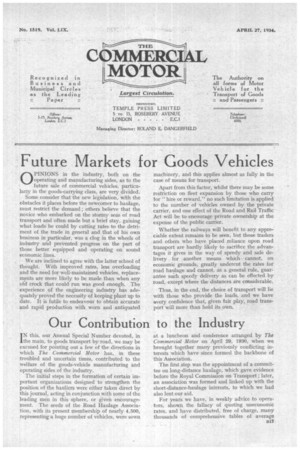Future Markets for Goods Vehicles
Page 83

If you've noticed an error in this article please click here to report it so we can fix it.
0 PINIONS in the industry, both on the operating and manufacturing sides, as to the future sale of commercial vehicles, particularly in the goods-carrying class, are very divided.
Some consider that the new legislation, with the obstacles it places before the newcomer to haulage, must restrict the demand ; others believe that the novice who embarked on the stormy seas of road transport and often made but a brief stay, gaining what loads he could by cutting rates to the detriment of the trade in general and that of his own business in particular, was a clog in the wheels of industry and prevented progress on the part of those better equipped and operating on sound economic lines.
We are inclined to agree with the latter school of thought. With improved rates, less overloading and the need for well-maintained vehicles, replacements are more likely to be made than when any old crock that could run was good enough. The experience of the engineering industry has adequately proved the necessity of keeping plant up to date. It is futile to endeavour to obtain accurate and rapid production with worn and antiquated machinery, and this applies almost as fully in the case of means for transport.
Apart from this factor, whilst there may be some restriction on fleet expansion by those who carry for" hire or reward," no such limitation is applied to the number of vehicles owned by the private carrier, and one effect of the Road and Rail Traffic Act will be to encourage private ownership at the expense of the public carrier.
Whether the railways will benefit to any appreciable extent remains to be seen, but those traders and others who have placed reliance upon road transport are hardly likely to Sacrifice the advantages it gives in the way of speedy and safe delivery for another means which cannot, on economic grounds, greatly undercut the rates for road haulage and cannot, as a general rule, guarantee such speedy delivery as can be effected by road, except where the distances are considerable.
Thus, in the end, the choice of transport will lie with those who provide the loads, and we have every confidence that, given fair play, road transport will more than hold its own.




















































































































































































